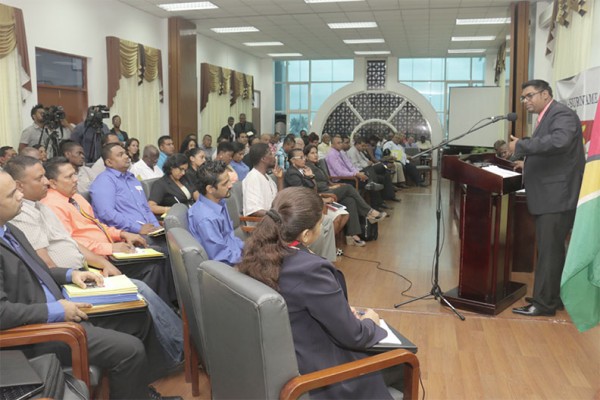Businesspersons from both Guyana and Suriname are pleading with the authorities in their countries to hasten processing of licences and necessary permits as long waiting times have been a major hindrance to investments in both countries.
“When you have to wait nearly three weeks for the processing of documents…send this to Georgetown, wait on this from customs etcetera, it does not do well for business expansion,” one Surinamese businessman yesterday told attendees at the bilateral trade conference of the two countries, being held at the International Conference Centre, Liliendaal.
Director of the Fernandes Group, Bryan Renter, whose company owns the Rossignol Butchery here and in Suriname, said that while obtaining licences and other documents to operate a business here was almost certain, the process for obtaining the requisite documents was a long “bureaucratic” one. “Something needs to be done differently so that there be improvement in this area,” he said to the applause of other businessmen and women at the conference.

Valrie Grant, the representative of the Jamaican engineering firm GeoTech Vision that operates in Guyana and is looking for business expansion in Suriname, pointed out that the “running around” to get necessary documents was frustrating.
The woman said that her company met a “chicken and egg” situation during the registering of the company as the Guyana Revenue Authority (GRA) explained that to register the business she needed a Tax Identification Number (TIN) and the required TIN would only come if you had a business or history doing business here. Being a new entrant to the local market, she had neither.
The Guyana Office for Investment (Go-Invest), which made a presentation at the conference, assured that as a facilitator for investment locally, it would do all it could possibly to reduce the time for processing.
However, the representative of the agency pointed out that there was only so much they could do as each agency had specified rules and timelines for documents.
Analyzing investment figures in Guyana and Suriname, official of the Suriname Business Development Centre, Gilbert Van Dijk lamented the 22 and 19 days, respectively, it takes for the completion of customs paperwork in both countries.
The preparation of documents alone, he said, takes 10 days in Suriname and 11 in Guyana, while customs clearance and inspections take five and four days, respectively. Van Dijk and businessmen and women from both countries called on customs to find a way to shorten the process.
To this end, the GRA announced that from last December businesses from Suriname no longer have to go to the Georgetown head office to have customs paperwork processed but that this was done in Berbice.
Many of the businesspersons seemed surprised at the announcement as they said they were not aware of the changes but nonetheless welcomed it.
Later at a press conference, delegates from both countries pointed out that the issue of timely processing was the key issue discussed at their meetings. “We have heard the calls for open borders.
They call it open borders meaning we must harmonise our taxation system, standard of products and other regimes to make doing business faster,” Chairman for Trade and Investment at the PSC Ramesh Dookhoo said, while adding “we are far from this dream of fiscal harmonisation.”
Nonetheless, he said the private sectors in both countries can help in getting the issue highlighted so that at the policy level requisite changes can be made. “It is our job as the private sector… we need to modify our trade laws and for us to do that we must have serious consultations,” he stated.
Surinamese officials informed that they have made note of issues faced by businesses and have been mandated by government officials from both countries to document these.
After this is done, a team will be set up to assess the complaints and recommendations made and to see where governments can facilitate policy changes to ensure the desired outcomes are met.
“We have been mandated to make note of the challenges and we did. Then a group will arrange for a meeting and pull together various recommendations and that will become part of policies,” Chairman of the Suriname Chamber and Industry Anil Padarath stated.
“It takes a whole day to come Paramaribo to Georgetown, not good enough …we have to sit down and discuss and it’s going to take a while but we are looking at the future,” he added.





